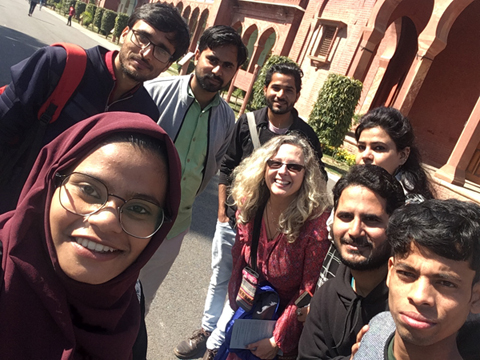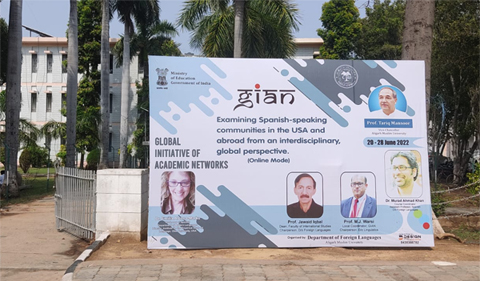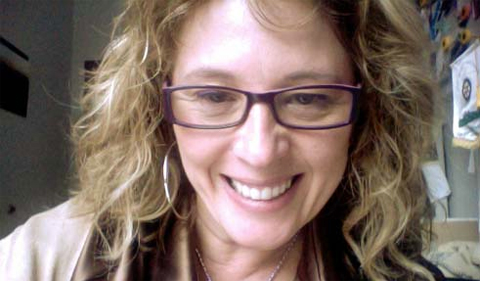As immigration politics abound in the United States, Dr. Emilia Alonso-Sameño organized a global seminar to talk about Spanish-speaking communities in the Americas from a global perspective.
Language, culture and identity are entwined for Alonso-Sameño, professor of Spanish in the College of Arts & Sciences’ Modern Language Department and director of the Institute for the Empirical Study of Language at Ohio University.
Building on the relationships she formed on her faculty fellowship leave in the spring of 2020, Alonso-Sameño collaborated with Dr. Murad Ahmad Khan, a colleague from the Department of Foreign Languages at Aligarh Muslim University in India, on a proposal for a Global Initiative of Academic Networks online seminar. India’s Ministry of Education funded their week-long seminar on “Examining Spanish-speaking communities in the U.S. and abroad from an interdisciplinary, global perspective,” which runs June 20-28.
Alonso-Sameño delivered the first lecture of the seminar, discussing solutions for challenges posed by immigration in the United States.
“We have to be very careful about the way we think and talk about immigration. We have to pay particular attention to this new culture of intolerance and prejudice taking over our social media. We can see it reflected in hate speech, which basically dehumanizes undocumented immigrants, stigmatizes their families, and justifies depriving them of basic human rights,” she said.
“This criminalizing of immigration has devastating effects in many other aspects of human life. One of such aspects is folks’ linguistic and cultural identities. We know that language is the intrinsic expression of our culture; it is the expression of who we are as individuals. So, forcing people to assimilate to and integrate in the host culture could have a negative impact on their identity.”
Alonso-Sameño, who believes that learning languages has both cognitive and cultural advantages, proposed that bilingual education can be one uplifting solution.
“What happens when we let go of our languages and cultures? Traditionally this has been a common phenomenon in the USA, where folks are ‘forced’ to integrate and their children are schooled in English, and bilingualism is not promoted. The belief that bilingual programs are ineffective downplays the linguistic, cultural and cognitive advantages in terms of flexibility of bilinguals.”
In her lecture, Alonso-Sameño reached into Spanish media, notably the role of Jorge Ramos, as a prominent Latino and news anchor for Noticiero Univisión, who believes in granting amnesty to all undocumented immigrants in the United States, to draw perspectives on today’s problems with immigration, and contrasting the views and experiences of Richard Rodriguez who is an avid advocate for monolingual schooling in English.
Alonso-Sameño delivers a total of 12 lectures in the multi-day seminar, with additional lectures by speakers including Federico Salas Lotfe, Ambassador of Mexico to India.
The lectures provide a forum for students, faculty, and secondary school teachers from a diversity of disciplines to come together and converse about key topics affecting migratory movements, displacement, discrimination of marginalized communities across the globe.
In one of her lectures— “Identity terms: Latino (Latina, Latinx) and Hispanic. With which term do people identify?”—Alonso-Sameño found room in language for everyone to self-identify as they wish.
“I think that, if labels are used to self-identify, then those are not problematic. If the LGBTQ+ community in the U.S., who identify as non-binary in terms of their gender, decide to use a neutral-gender term, like Latinx or Latine, instead of Latino/a, that is fantastic. If the label is an imposition or ‘official’ categorization, then I would question it,” she noted.
“In recent years, LGBTQ+ activists, feminists, linguists, among others, all over the world have defended the use of more inclusive language, both by creating entirely new non-binary terms and by reassembling already existing words and expressions. However, there have been many challenges. For some people, it can be difficult, scary or tedious having to keep explaining why there should be more inclusive language. It can also be dangerous. For example, just in our country, hate crimes against the LGBTQ+ community have been rising the last six years.”






















Comments